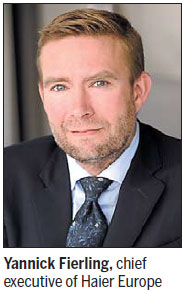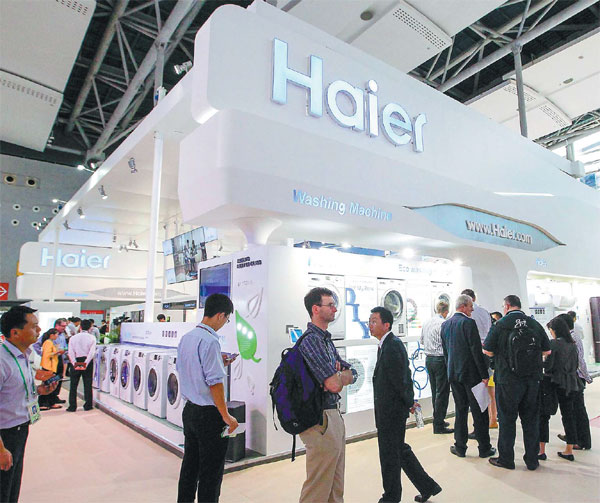White goods brigade looks for more color

Manufacturers discover there is life beyond fridges and washing machines
The Chinese white goods manufacturer Haier Group is looking to increase its sales in Europe by extending its product range to include consumer electronics and energy management systems.
Haier's expansion in Europe reflects a growing trend of Chinese white goods firms expanding their operations internationally after securing significant market share at home. Two of the other companies are Changhong Electric Co Ltd and Hisense Electric Co.
| Haier's expansion in Europe reflects a growing trend of Chinese white goods firms expanding their operations internationally after securing significant market share at home. Provided to China Daily |
In the second half of this year Haier will launch a smartphone, connected watch and tablet computer in Europe, with the marketing emphasis being on high-quality products at affordable prices.
"Haier is keen to provide solutions for the home," says Yannick Fierling, chief executive of Haier Europe.
"We are already providing white goods, but we are expanding into consumer electronics and energy management systems, such as solar panels and heat pumps. We are building connected platforms."
An example of connected products is a Haier cell phone application that controls one of the company's washing machines, he says.
"Currently our biggest challenge in Europe is brand recognition. We have great products, but not enough consumer recognition, so we need to promote our brands and make consumers understand the quality of our products, and become more visible."
A smartphone would generate more brand awareness than products such as refrigerators, he says. "If you have a phone in front of you, and you hold it in your hands, it creates great brand recognition."
To break into the smartphone market, Haier's phones are designed to offer value for money. Haier's new Voyage smartphone collection, to be launched in autumn, features three products: the G30, V3 and V5.
The most expensive, the V5, is a 5.5-inch (14 cm) full HD screen with support for gesture control, running on a 1.7 GHz 64-bit processor, retailing at 349 euros.
Another core product Haier is launching alongside the smartphone is a connected watch, designed for children between the ages of 2 and 8, with a button that can be used to alert parents when the child is in trouble.
Fierling says the connected watch is an example of Haier's brand ethos of listening to customers. "We are responding to a clear consumer demand, because in our environment parents are getting more and more concerned and connected, and Haier has noticed this."
Haier, founded in Qingdao in Shandong provice in 1984 by Zhang Ruimin, the chairman and chief executive, started as a producer of refrigerators, and over the years moved into a range of white goods, including microwave ovens, coolers, and consumer electronics and other products.
It quickly expanded into international markets, initially by opening up factories in emerging economies such as Indonesia, Malaysia and the Philippines, and operating in mature markets through original equipment manufacturer contracts.
By the turn of the century Haier had started to sell branded products in developed markets, championing its "zero distance" to customer value. In the United States it entered the market by selling compact refrigerators to college students, filling a gap in the market. Within a few years Haier had gained 53 percent of the market share.
Haier Europe, whose headquarters are in France, has subsidiaries in Belgium, Britain, Germany, Italy, Poland, Russia and Spain. Sales for the 2014-15 financial year were worth about 500 million euros. It employs about 500 people in Europe.
A research and development center covering more than 1,000 square meters in which designs for dishwashers, refrigerators and freezers are refined opened in Nuremberg in 2011.
Europe is strategically important for Haier because it is a mature market with a heavy concentration of top white goods brands, and that pushes Haier to be more innovative, Fierling says.

In 2013, one of its fridges won an award in Germany for its design.
Hisense is a another Chinese white goods firms that has used its experience as an original equipment manufacturer for European firms to focus on its branded products.
"We are growing fast because we have great products and we understand the needs of customers in the UK market," says Louis Hou, managing director of Hisense UK.
Starting from refrigerators when Hisense first entered Britain, it has broadened its product range to include televisions, smartphones, tablets and washing machines. Some of its TV products are made in Eastern Europe by contract partners, but Hisense has plans to open its own factories in Europe in the near future.
In 2009 it started to focus on marketing its own branded products in Europe. This led to the establishment of subsidiaries in Italy, Germany and Spain, followed by Britain in 2012 and France last year.
Changhong has set up a factory in the Czech Republic, making televisions for the local market and other European countries.
Fierling, who joined Haier in March, previously worked for a US home appliance firm and has been active in the white goods market for 15 years.
Although Haier was not big when he first joined the industry, he was impressed with the Chinese firm's quality and fast growth, he says.
"Back then, I got the impression that Haier was a brand that listens very much to the end consumer. They know what the consumer is looking for and grow according to these consumer expectations."
Fierling says that he is impressed with the zero-distance concept, the idea that everyone in the firm take consumer needs into account in their day-to-day work.
One good example of this concept in Europe is the establishment in 2010 of the Haier Club, which enables Internet users to talk about Haier products and exchange tips and comments, he says. It now has 120,000 members, the company says.
Another tool Haier has used to stay close to its customers is its European call center, which allows technicians to respond to customers in many European languages.
Haier has also conducted many branding activities in Europe, one example being a two-year partnership with the Science Museum in London to promote the Haier brand. It sponsored a dedicated space in the Launchpad, a gallery dedicated to encouraging children and young people to explore science firsthand.
Its UK after-sales customer service includes a Web-based service that caters to customers whose warranty has expired, allowing them to locate a spare part required by searching the model number and type.
cecily.liu@chinadaily.com.cn
(China Daily European Weekly 05/29/2015 page21)
Today's Top News
- Japan tempting fate if it interferes in the situation of Taiwan Strait
- Stable trade ties benefit China, US
- Experts advocate increasing scope of BRI to include soft power sectors
- New engine powers cargo drone expansion
- China to boost green industry cooperation
- Manufacturing PMI rises in November































